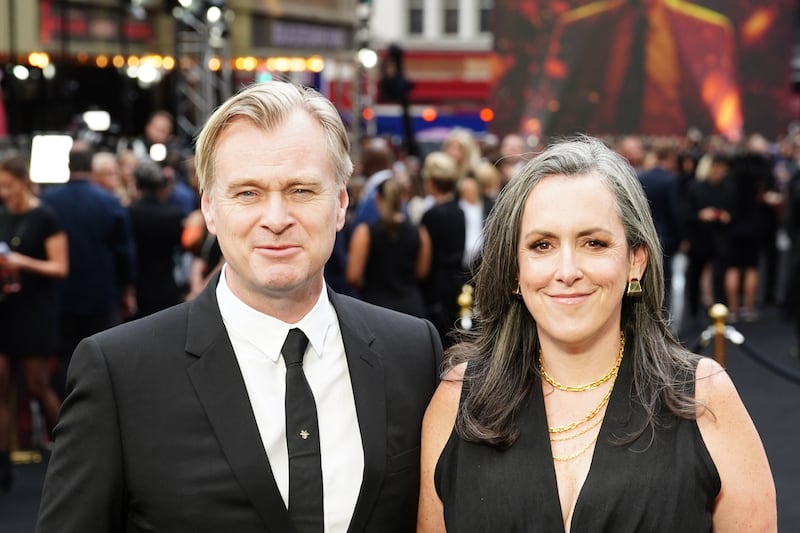
OPPENHEIMER (15, 180mins) Drama. Starring: Cillian Murphy, Emily Blunt, Matt Damon, Robert Downey Jr, Josh Hartnett, Florence Pugh, Jack Quaid, Benny Safdie, Macon Blair, Jason Clarke, Rami Malek, Kenneth Branagh, Tom Conti, Dylan Arnold, Casey Affleck, Gary Oldman
Director: Christopher NolanRelease date: July 21
"NOW I am become Death, the destroyer of worlds": as the pre-eminent pioneer of the atomic bomb, J Robert Oppenheimer was able to quote this famous passage from the Hindu scripture the Bhagavad-Gita without irony upon witnessing the first successful test of the nuclear weapon he'd developed for the US military.
Christopher Nolan's star-studded bio-epic offers a powerful and disturbing dramatisation of how this brilliant quantum physicist willingly played a key role in America's race to beat the Nazis to the A-bomb during the Second World War – and how his terrifying atomic creation changed the world forever.
The US scientist believed the mere existence of such a devastating device could help put an end to all future warfare – or at least, that's what he said he believed. "Theory will only take you so far" becomes something of a mantra within the film: indeed, the problem with creating a new super-weapon for an army itching to flex its muscles against any and all enemies is that it will inevitably want to use it.
By the time the scales have been nuked from Oppenheimer's eyes by the horrifyingly destructive power of a test detonation in the middle of the New Mexico desert in July 1945, it's too late to turn back – the irradiated toothpaste is now well and truly out of the tube.

The US bombed Nagasaki and Hiroshima the following month, a 'shock and awe' tactic designed to force Japanese surrender, and thus end the Second World War. The bombings killed hundreds of thousands of innocent civilians instantly, with thousands more later dying agonising deaths from radiation poisoning.
As Nolan's timely film reminds us, this 'exercise' was as much about the US government sending a pointed message to their nominal war allies at the Kremlin as putting an end to the war.
Read more:
Cillian Murphy: Oppenheimer affected me on an atomic level
Emily Blunt: The whole Oppenheimer crew read American Prometheus before filming
Cast of Oppenheimer walk out of UK premiere ahead of actors’ strike announcement

Good old-fashioned revenge was another factor: "Pearl Harbor and four years of American deaths overseas apparently buys a lot of latitude with the American public," is how one US Army top brass describes the apparent indifference of US citizens to such unprecedented acts of mass destruction.
Based upon Kai Bird and Martin J Sherwin's Pulitzer Prize-winning book American Prometheus: The Triumph And Tragedy Of J Robert Oppenheimer, Nolan's sobering biopic of the 'father' of nuclear weapons is as much an exploration of mankind's flaws as the foibles of its titular scientific god, who emerges from the war as a hero and Time Magazine cover star while haunted by awful visions of the nuclear destruction he's unleashed.
In his early years, the broad-minded Oppenheimer (Cillian Murphy, in a riveting, career-best performance) is a physics genius blessed/cursed with an empathetic streak – his 'left-leaning' tendencies don't play well in an America becoming obsessed with 'Reds under the bed' – but this emerging atomic deity is as susceptible as any mere mortal to vanity, lust and other sins.


Eventually marrying the boozy, highly intelligent and fiercely loyal Kitty (Emily Blunt, also fantastic), he has multiple affairs – notably with the excellent Florence Pugh's troubled Jean Tatlock, a hot-blooded depressive and card-carrying Communist who demands sex with a side of Hindu scripture in one slightly too on-the-nose love scene (what's 'foreshadowing' in Sanskrit?) – and, when courted by the US military to run the A-bomb-focused Manhattan Project, ego clouds judgment so that he can enjoy playing the starring role in this high profile, top secret atomic test programme.

Despite being a New York-born Jew, Oppenheimer loved America's western deserts as much as he did science. "I thought if I could ever manage to combine physics with New Mexico, then I'd truly be happy," he enthuses, and Nolan's camera delights in playing with classic Western iconography by framing 'Oppi' as the sheriff/mayor of Nuke Town, strolling the dirt streets of the improvised settlement the US Army built for him in the desert wilds of Los Alamos at the behest of Lieutenant General Leslie Groves (a top-drawer performance from Matt Damon): a live-in research facility where he and a hastily-assembled team of top atomic big brains can work day and night in secrecy as they hustle to win the atomic race.

Well, relative secrecy: Robert Downey Jr is perfectly cast as Lewis Strauss, a politically ambitious civil servant who becomes a big cheese at the US Atomic Energy Commission. At first, he courts Oppenheimer's services and then, post-war, goes all out to ruin his reputation.
Strauss helps paint the experience-sobered physicist as a Soviet spy who leaked atomic secrets to the Russians, helping to ensure that this none-more-knowledgeable voice of caution is cut out of the nuclear weapons conversation just as it becomes focused on perfecting the even more terrifyingly destructive hydrogen bomb.
Arguably, Strauss's actions may have helped wind the hands of the Doomsday Clock forward by a good few hours – and all because he felt Oppenheimer had publicly embarrassed him years before.
It's precisely the kind of unexpected ripple effect this film is obsessed with. At one point during their research phase, Oppenheimer and co get in a sweat over the possibility that setting off an atomic bomb might actually start a terminal chain-reaction which would ignite Earth's atmosphere and destroy the entire planet.
This "near-zero" probability is mined for darkly comic effect in the movie as the nerve-wracking countdown to test day accelerates, and of course, on the day, that cataclysm never happened: but the detonation of the A-bomb did set in motion a chain of events which continues to threaten mankind's existence almost 80 years after that fateful first mushroom cloud erupted over the New Mexico desert – an event recreated by Nolan in absolutely spine-chilling manner for a film that's surely one of his finest and most important works to date.
Rating: 4/5
:: Oppenheimer is screening at Queen's Film Theatre from Friday July 21, tickets and times via queensfilmtheatre.com








